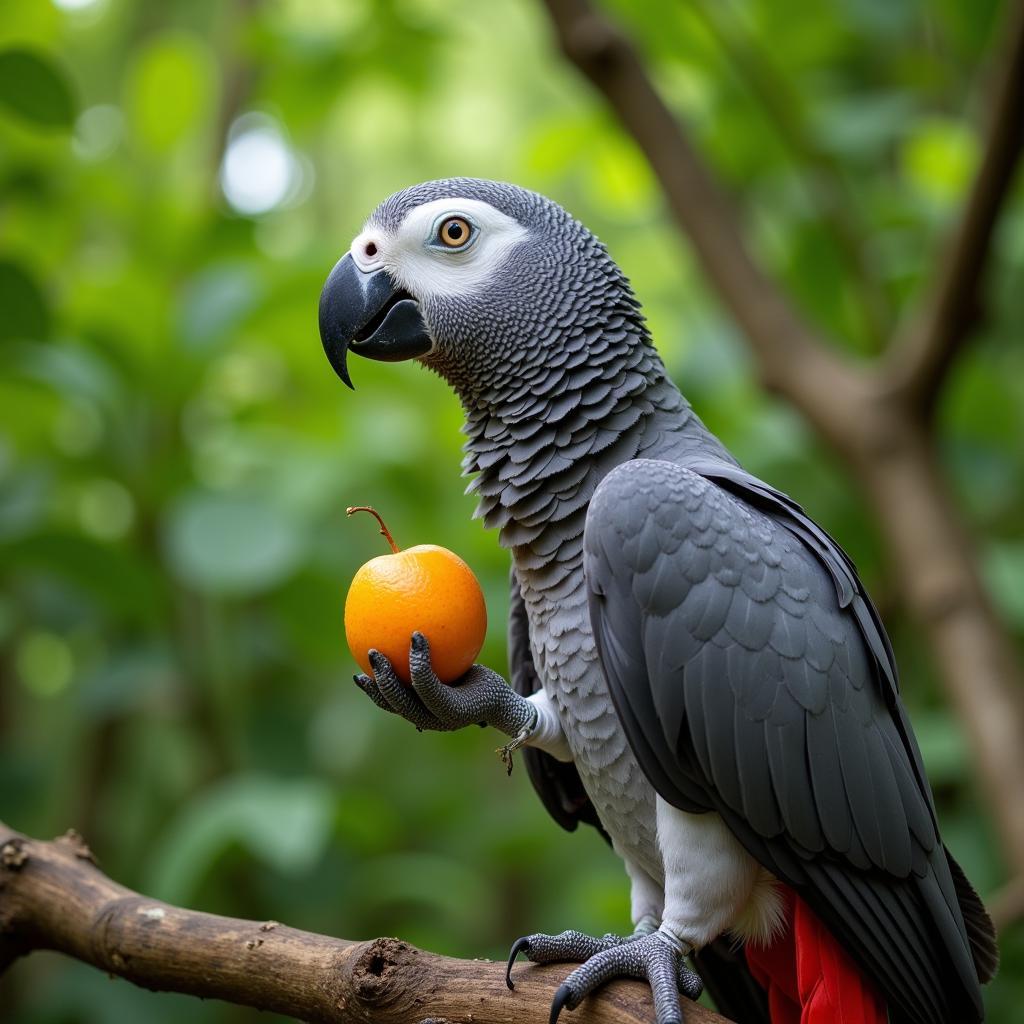The African Grey Parrot’s Natural Diet: A Guide to Keeping Your Feathered Friend Healthy
The African Grey Parrot, renowned for its intelligence and ability to mimic human speech, is a beloved companion. Ensuring your feathered friend thrives goes beyond providing a spacious cage and stimulating toys. A crucial aspect of their well-being lies in understanding and replicating their natural diet as closely as possible.
 African Grey Parrot enjoying fruit in its natural habitat
African Grey Parrot enjoying fruit in its natural habitat
Beyond Seeds: Exploring the African Grey’s Wild Diet
In their native habitats across West and Central Africa, African Grey Parrots enjoy a diverse diet far removed from the seed-heavy mixes commonly found in pet stores. These intelligent birds are opportunistic eaters, foraging for a variety of foods throughout the changing seasons.
Their natural diet comprises:
- Fruits: A significant portion of their intake, providing essential vitamins and minerals. Wild figs, berries, and palm fruits are particular favorites.
- Seeds: While not the mainstay, seeds still contribute to their nutritional needs. They selectively consume seeds from various plants, opting for those rich in healthy fats and proteins.
- Nuts: Offering a good source of energy, nuts like almonds and walnuts are enjoyed when available.
- Flowers: African Greys often feast on the nectar and petals of blooming flowers, adding variety and additional nutrients to their diet.
- Vegetation: Leaves, buds, and bark provide essential fiber and trace elements.
Replicating the Wild Diet at Home
While perfectly mimicking their wild diet is impossible, providing a close approximation is key to a healthy, happy African Grey.
Essential Components of a Captive Diet:
-
High-Quality Pelleted Food (60-70%): Formulated to meet their nutritional needs, choose a reputable brand specifically designed for African Greys.
-
Fresh Fruits and Vegetables (20-30%): Offer a colorful variety daily. Leafy greens, chopped carrots, bell peppers, apples, berries, and melons are all excellent choices.
-
Healthy Nuts and Seeds (10-20%): Provide these in moderation. Almonds, walnuts, pumpkin seeds, and sunflower seeds can be offered as treats or incorporated into foraging toys.
Toxic Foods to Avoid:
- Avocado
- Chocolate
- Caffeine
- Alcohol
- Table scraps (high in salt, sugar, and fat)
Tips for a Healthy Diet:
- Introduce new foods gradually. Offer small amounts alongside familiar favorites to encourage acceptance.
- Wash all fruits and vegetables thoroughly. Remove seeds and pits from fruits like apples and cherries.
- Rotate food choices regularly. This ensures a varied nutrient intake and prevents boredom.
- Provide fresh water daily. Change the water at least twice a day to keep it clean and appealing.
- Consult an avian veterinarian. Regular checkups are vital for monitoring your parrot’s health and dietary needs.
FAQs:
1. Can my African Grey eat only pellets?
While high-quality pellets offer a balanced diet, providing fresh fruits, vegetables, and occasional nuts and seeds is essential for enrichment and psychological well-being.
2. My parrot is a picky eater. What can I do?
Try offering new foods in different ways, such as chopped, grated, or mixed with other favorites. Patience and persistence are key.
3. How much should I feed my African Grey daily?
The exact amount varies based on age, activity level, and metabolism. Observe your parrot’s intake and adjust accordingly. Consult an avian veterinarian for personalized guidance.
Need More Help?
For personalized advice on your African Grey’s diet, contact us at:
Phone: +255768904061
Email: [email protected]
Visit us at: Mbarali DC Mawindi, Kangaga, Tanzania.
Our dedicated team is available 24/7 to assist you.

